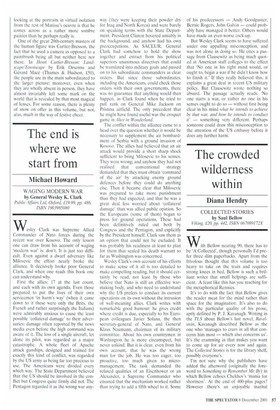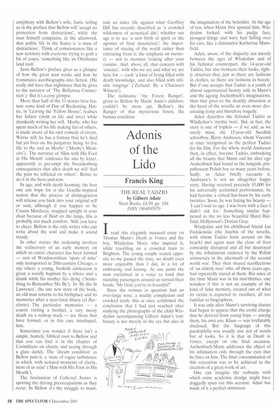The crowded wilderness within
Diana Hendry
COLLECTED STORIES by Saul Bellow
Viking, 420, pp. 442, ISBN 067089172X
With Bellow nearing 90, there has to be 'A Collected', though personally I'd prefer three slim paperbacks. Apart from the frivolous thought that this volume is too heavy to take on the train and requires strong knees in bed, Bellow is such a brilliant writer that small helpings are sufficient. A feast like this has you reaching for the metaphorical Rennies.
It's to do with the fact that Bellow gives the reader meat for the mind rather than space for the imagination. It's also to do with the particular quality of his prose, aptly defined by P. J. Kavanagh. Writing in the TLS about Bellow's last novel, Ravelstein, Kavanagh described Bellow as the one who 'manages to cram in all that concerns him most — which also concerns us'. It's the cramming in that makes you want to come up for air every now and again. The Collected Stories is for the library shelf, possibly everyone's.
I'm not sure why the publishers have added the afterword (originally the foreword to Something to Remember Me By) in which Bellow echoes Chekhov's 'mania for shortness'. At the end of 400-plus pages? However there's an enjoyable marital antiphony with Bellow's wife, Janis, telling us in the preface that Bellow will 'accept no protection from distractions', while the man himself complains, in the afterword, that public life in the States is 'a mass of distractions'. Think of consciousness like a new territory with everyone trying to grab a bit of yours, 'something like an Oklahoma land rush'.
Janis Bellow's preface gives us a glimpse of how the great man works and how he transmutes autobiography into fiction. (He really did have that nightmare that he gives to the narrator of 'The Bellarosa Connection'.) But it's a cosy glimpse.
More than half of the 13 stories here feature some kind of Day of Reckoning. Hattie, in 'Leaving the Yellow House', realises her failure (sloth in life and love) while drunkenly writing her will. Mosby, who has spent much of his life making fun of others, is made aware of his own comedy of errors. Worse still, he has a fantasy that he's died but yet lives on, his purgatory being 'to live life to the end as Mosby' (Mosby's Memoirs'). The narrator of 'Him with His Foot in His Mouth' confesses his sins by letter, apparently to pre-empt the Swendenborg consequences that after death we will 'feel the pain we inflicted on others'. Better to do it in the here-and-now.
In age, and with death looming, the best one can hope for is the Goethe-inspired notion that the process of disintegration will release you back into your original self or soul, although if you happen to be Cousin Mordecai, strapped upright in your chair because of fluid on the lungs, this is probably not much comfort. Still, you have to cheer, Bellow is the only writer who can write about the soul and make it sound trendy.
In other stories the reckoning involves the rediscovery of an early memory on which an entire character has been formed — sort of Wordsworthian 'spots of time' only transported to 20th-century Chicago, a city where a young, bookish adolescent is given a wordly baptism by a whore and a drunk while his mother lies dying (Something to Remember Me By'). In 'By the St Lawrence', the one new story of the book, an old man returns to his birthplace and its memories after a near-fatal illness (cf Rayelstein). The particular memories — a cousin visiting a brothel, a very messy death on a railway track — are those that have formed, or in this case misshaped, him.
Sometimes you wonder if there isn't a simple, homely, biblical root to Bellow and that you can find it in the chapter of Corinthians on charity and seeing through a glass darkly. The 'dream condition' as Bellow puts it, a 'state of vague turbulence in which, with isolated moments of clarity, most of us exist' (Him with His Foot in His Mouth').
The fascination of Collected Stories is spotting the driving preoccupations as they recur. In Bellow it's the struggle to main tam n an inner life against what Geoffrey Hill has recently described as 'a crowded wilderness of acoustical din'; whether our age is to see 'a new birth of spirit or the agonies of final dissolution'; the importance of staying of the world rather than retreating from it; the emphasis on memory — not to mention looking after your cousins. And, above all, that concern with 'essence', with who we are and what we are
here for each 'a kind of being filled with death knowledge, and also filled with infinite longings' (Zetland: By a Character Witness').
The nickname 'the Forest Ranger', given to Bellow by Matin Amis's children, couldn't be more apt. Bellow's the Ranger of that mysterious forest, the human condition.























































































 Previous page
Previous page